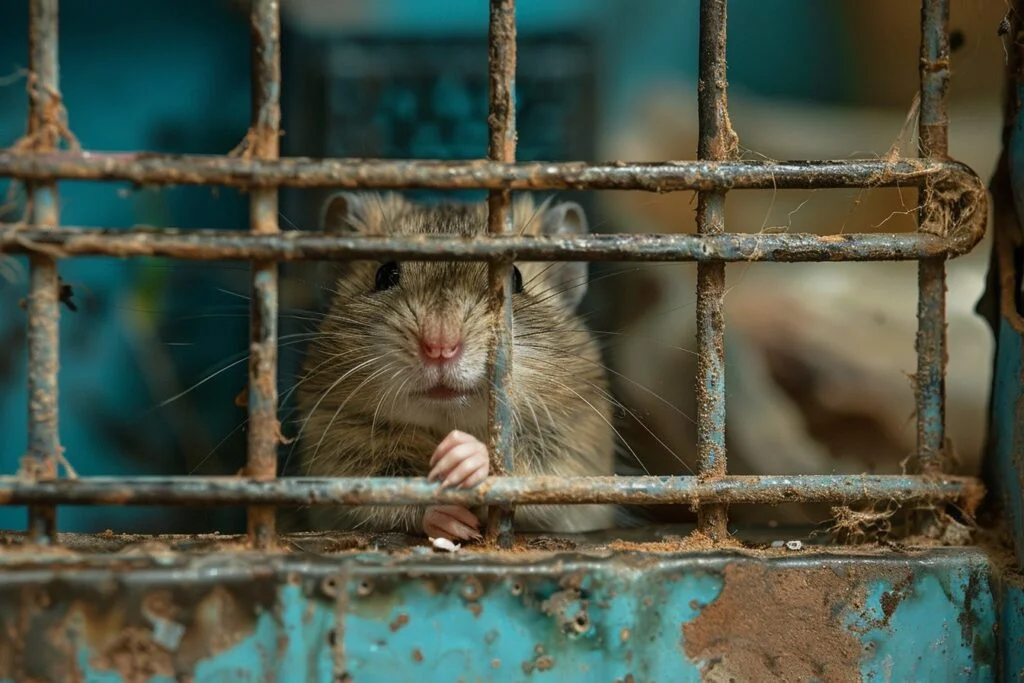Just watching your hamster scratch away like it’s their job, and you’re left wondering what’s behind this itchy frenzy. Newsflash: it’s not just because they’re trying to get out of their cage (although, let’s be real, who can blame them?). There are some legit reasons why your friend is going bananas, and it’s time to get to the bottom of it. From pesky parasites to food sensitivities, and even environmental stressors, the possibilities are endless. But don’t worry, we’re about to find the most common culprits behind your hamster’s itch attack – and what you can do to stop the scratching madness.
Key Takeaways
- Hamster itching can be caused by parasites like mites, lice, and fleas, as well as skin irritation, allergies, and dietary factors.
- A hamster’s environment, including dusty or old bedding and chemical smells, can trigger itching and discomfort.
- A balanced diet rich in omega-3 fatty acids and low in sugar, salt, and fat is essential for maintaining healthy skin and coat.
- Skin issues and infections, such as mange, demodex mites, and bacterial or fungal infections, can cause excessive scratching and discomfort.
- Identifying the underlying cause of itching is crucial for effective treatment, and consulting a veterinarian is necessary if itching persists or worsens over time.
Common Causes of Hamster Itching
Your hamster is scratching like crazy, and honestly, it’s not because they’re trying to get to that one itch on their back that they just can’t reach.
Sorry to break it to you, but it’s probably something more serious than that. One common culprit behind all that itching is hamster mites. These tiny critters can cause your furry friend a lot of discomfort, leading to excessive scratching and even hair loss.
But don’t freak out just yet – mites are relatively easy to get rid of with some medicated shampoos and a thorough cage cleaning.
Another possible reason for all that itching is dry skin. Yep, just like us, hamsters can get dry skin too! A humid environment and some skin-friendly treatments can help soothe their itchy woes.
Parasites That Affect Hamsters
Some common parasites that affect hamsters:
| Parasite | Symptoms |
|---|---|
| Mites | Excessive scratching, hair loss, and redness |
| Lice | Itching, scratching, and restlessness |
| Fleas | Biting, chewing, and hair loss |
The good news is that these parasites can be treated with Ivermectin drops or other medications. But, you must correctly identify the parasite before treating your hamster. Consult with a vet to determine the best course of action. Remember, a healthy hamster is a happy hamster, and a happy hamster is one that’s parasite-free! So, take action, and get rid of those unwanted critters!
Skin Irritation and Infections

Behind the cute, cuddly exterior of your hamster lies a skin irritation nightmare waiting to happen, and it’s up to you to prevent it!
As a responsible hamster parent, you need to be on the lookout for signs of skin irritation and infections, which can lead to excessive scratching and discomfort in your furry friend.
Mange is a contagious skin infection caused by mites that can lead to dry skin, scratching, scabbing, and hair loss.
Demodex mites are the most common external parasites that can cause hair loss, dry and scaling skin, scabbing, and dandruff.
Bacterial and fungal infections can develop secondary to skin irritation or allergies, making it essential to monitor your hamster’s behavior and health closely.
Notoedres ear mites can lead to crusting and lesions on the ears, face, genitalia, and feet.
Allergies and Sensitivities
Now that you’ve got a handle on the creepy crawlies causing skin issues, let’s talk about the stuff your hamster might be allergic to.
Your hamster can be allergic to things like bedding materials, cleaning products, or even certain foods. Yep, those cute little paws can be super sensitive! If your hamster is itching non-stop, it might be due to an allergy or sensitivity.
Common allergy culprits include wood shavings, pine or cedar bedding, and even certain types of hay. You might need to switch to a different bedding material, like paper-based products or aspen shavings, to see if that helps alleviate the itching.
Cleaning products with strong chemicals can also cause skin irritation, so make sure to use pet-safe cleaners or opt for natural alternatives like vinegar and water.
Keep an eye out for signs of allergies, like excessive itching, scratching, or hair loss. If you suspect an allergy is the cause of your hamster’s itching, try making some changes to their environment and see if that helps clear things up.
Dietary Factors to Consider
You’re probably thinking, ‘What’s the big deal about food, my hamster eats whatever’s in that bowl’
Well, let me tell you, diet plays a huge role in your hamster’s health, including their skin health. An improper or insufficient diet can lead to skin problems and irritations, causing all that scratching you’re concerned about.
Dietary factors that impact your hamster’s skin health include:
Supplement with care: Hamster pellets should be supplemented with healthy treats, but don’t overdo it on the sunflower seeds and other treats that can cause nutritional imbalances.
Fresh is best: Fresh fruits and veggies can be great additions to your hamster’s diet, but introduce them gradually to avoid digestive upset.
Omega-3s are key: A diet rich in Omega-3 fatty acids can help reduce inflammation and promote healthy skin and coat.
Avoid the bad stuff: Steer clear of foods high in sugar, salt, and fat, which can exacerbate skin problems and lead to other health issues.
Environmental Triggers to Identify

Take a closer look at your hamster’s surroundings, because it’s time to get real – their itchy skin might just be a cry for help from a toxic environment!
You might think you’re providing a comfy space, it’s time to inspect every nook and cranny.
Is the bedding too dusty or old? Maybe it’s causing irritation and making your hamster go crazy with itching.
Have you recently introduced a new toy or decoration that’s got some weird chemical smell? Yeah, that could be the culprit too!
Even the cleaning products you use around the cage might be causing more harm than good.
Signs and Symptoms to Watch
Your hamster’s itchy antics are trying to tell you something – so, pay attention to those constant scratching sessions! It’s not just cute; it’s a cry for help. As a responsible hamster parent, it’s your job to decipher what’s behind that incessant itching.
- Excessive scratching: If your hamster is scratching more than usual, it’s a clear indication that something’s amiss.
- Hair loss: Bald patches or thinning fur can be a sign of itching caused by skin issues or parasites.
- Redness and inflammation: If your hamster’s skin is red, swollen, or inflamed, it’s likely they’re experiencing discomfort or pain.
- Changes in behavior: If your hamster is acting lethargic, aggressive, or withdrawn, it could be a sign that they’re feeling unwell or uncomfortable due to itching.
Don’t ignore these signs – your hamster is counting on you to figure out what’s going on and put an end to that itching misery!
Treatment and Prevention Options
Now that you’re aware of the signs that your hamster’s screaming for help, it’s time to get proactive and kick that itch to the curb!
The first step in treating and preventing itching is to identify the cause of itching. Is it a dirty cage or an allergic reaction to bedding?
Whatever the reason, it’s time to get cleaning! Regularly cleaning the cage and replacing bedding with natural, perfume-free alternatives can work wonders.
A balanced diet is also essential in preventing scratching behavior, so make sure your hamster is getting all the nutrients they need.
If the problem persists, it may be time to bring in the big guns – topical treatments like Ivermectin drops can help tackle mite infestations and other skin issues.
When to Consult a Veterinarian
You’ve tried everything to soothe your hamster’s itchy woes, but if the scratching persists, it’s time to call in the pros!
A veterinarian is the next step when the following signs appear:
Excessive scratching: If your hamster is scratching so much it’s causing hair loss, open sores, or bleeding, it’s time to get professional help.
Infection: If you notice any signs of infection, such as redness, swelling, or discharge around the eyes, ears, or nose, don’t hesitate to consult a vet.
Changes in behavior: If your hamster’s itching is causing changes in behavior, like loss of appetite, lethargy, or aggression, it’s time to get to the bottom of the issue.
Hamsters ears: If your hamster’s ears are affected, with signs of inflammation, discharge, or a strong odor, a vet visit is in order.
Conclusion
You’ve finally cracked the code, detective!
Your hamster’s itching mystery has been solved. Now, it’s time to put the puzzle pieces together and create a masterplan to soothe their scratchy woes.
Think of it like a treasure map, leading you to the treasure of a happy, healthy hamster.
Don’t let the culprits – parasites, skin irritation, allergies, and dietary missteps – get the best of you.
Stay one step ahead, and your furry friend will be dancing with joy, not scratching with despair!




